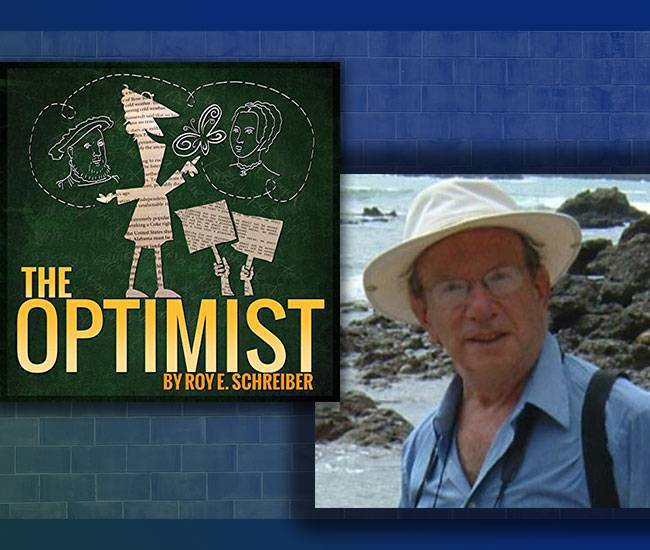Where do characters come from? Here’s the inspiration for one created by Roy E. Schreiber: “At one time during my career as a college professor, I encountered another professor who was absolutely convinced that communism was so logical that it made no sense to accept any other explanation of how the world worked.”
Fiction imitates life. Listeners may want to keep that in mind as they experience Schreiber’s new “audio play” The Optimist (our review), a hilarious romp through a remote Midwestern university and a few of its roaring band of professors.
Schreiber does an admirable job mixing the camaraderie and comedy of faculty dialogue with the inevitable office romances. While the story advances swiftly, there’s still plenty for listeners to absorb from individual character studies.
The author recently provided more insight into The Optimist in this Q&A.
Q: Why do people enjoy so much the idea of satirizing and poking fun at the exploits of university professors?
A: For current and former students, even the most approachable university professor comes off as an authority figure. It is a kind of national sport to deflate authority figures. As a former professor, I can assure you students often love to gossip about their professors’ private lives. The deflation and the gossip make the professors seem more human. To use characters from the play, the dedicated Ralph Wise as well as the pompous Gary Pine are both, in their separate ways, prime targets for deflation and gossip.
Q: Tell us about the concept of the “audio play” and why you chose this format to present your work.
A: There are many, many more talented playwrights than available stage space for their work. To have more than family and friends as an audience, an audio play format means the work is available for a worldwide audience to find. My last audio play, Happy Family, had listeners in Portugal and New Zealand.
Q: Fiction always seems to relate to real experience. Can you provide a little insight into where your characters came from and were they inspired by any real-life professors?
A: No writer invents characters without having had some experience with similar people. Ralph Wise could act as an example. At one time during my career as a college professor, I encountered another professor who was absolutely convinced that communism was so logical that it made no sense to accept any other explanation of how the world worked. (He went to Cuba to cut sugar cane, but the Castro government threw him out as a nuisance. He also had a rather extensive and quite successful investment portfolio.) It was only a short jump from him to Ralph Wise.
Q: You could have chosen a variety of relevant titles for this work, and you went with The Optimist. Why?
A: The title, The Optimist, was a “leftover” from an earlier version of the play. Besides the communist investor, part of the model for the Ralph Wise character was the titular figure of Zadig from a Voltaire novella of the same name. Zadig kept trying to use reason to convince people to behave in a moral way and he kept failing. Voltaire’s most famous optimistic character is probably Candide, who thought everything was best in this best of all possible worlds. The original opening line to this play was something like, “Who is the true optimist? Candide who always sees the best in people, or Zadig who believes that everyone can be logical?” The line got thrown out (too pretentious), but the title stuck.
Q: What do you hope listeners will take away from this story?
A: I hope the chief takeaway for the audience from the play is enjoyment and amusement. If they also took away the idea that professors really needed to get out into the world beyond their ivory tower, that would be nice too.
The Optimist is now available for purchase (Author’s Republic). Learn more about Schreiber on his author profile page.
https://booktrib.com/wp-content/uploads/2020/01/roy-s-300×300-1.jpg
Roy E. Schreiber
After college (UCLA and University of London), Roy Schreiber spent a good deal of time teaching British History at a branch campus of Indiana University. Like all the other professors, he wrote academic books. His were about people who lived in the 16th and 17th centuries. Only about 50 other academics in the world would even recognize their names. It seemed like a lot of effort for a small audience, so he switched to more popular topics. A short list includes the British navy, Tahiti, Australia and the U.S. Red Scare of the 1950s. Then, of course, there are the satires on academic life. Now he publishes books, both audio and print, short stories, and also writes and produces plays for the stage and for radio and podcasting.




